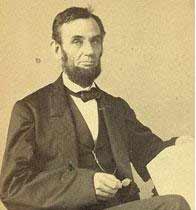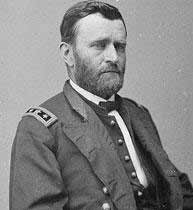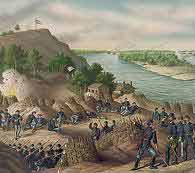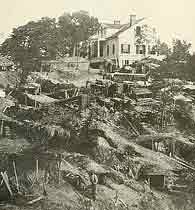Welcome to THE MAKING OF A NATION -- American history in VOA Special English.
In 1863, Union forces defeated Confederate forces in the bloodiest battle of the American Civil War -- the Battle of Gettysburg. Soon after that, the Union won another important victory, seizing Vicksburg, Mississippi.
This week in our series, Kay Gallant and Harry Monroe continue our story of the Civil War with the Battle of Vicksburg.
VOICE ONE:

In November 1863, President Lincoln traveled to Gettysburg, Pennsylvania. He spoke at the opening of a military cemetery. He felt very tired by the time he got back to Washington. Doctors thought he had a cold. Later, they said he had a weak form of smallpox.
The president remained in bed. Few visitors could see him. There was a danger the smallpox could spread.
Lincoln got better after a few weeks. He began working on his yearly message to Congress. After two-and-a-half years of war, he had good news to report. Union armies had gained two important victories at about the same time.
VOICE TWO:
One was the battle of Gettysburg. Union forces led by General George Meade had defeated Confederate forces led by General Robert E. Lee. They pushed Lee back into Virginia. It was the last Confederate invasion of the North.
The day after the battle of Gettysburg, Union forces defeated Confederate forces at Vicksburg, Mississippi. This victory gave them control of the Mississippi River. And it split the states of the Confederacy.
VOICE ONE:
Union General Ulysses Grant had been trying to seize Vicksburg for several months. It was not easy. Vicksburg lay on the east side of the Mississippi River. It was built high above the water on a rocky cliff. As the river flowed past Vicksburg, it turned in sharply at the base of the cliff and then continued on to the Gulf of Mexico.
The Confederates had placed cannon all along the sharp turn in the river. Enemy boats sailing past, made easy targets.
(MUSIC)
VOICE TWO:

General Grant began the campaign for Vicksburg in late 1862. His army was west of the Mississippi River. He needed to get to the other side to attack the city.
First, Grant planned to cross the river into northern Mississippi state. Then he would march south to Vicksburg. He crossed the river. But Confederate forces destroyed his transportation and supply lines. He withdrew. Early in 1863, he tried again.
VOICE ONE:
This time, he planned to sail his men past Vicksburg. They would cross the river a little downstream, turn and attack.
Grant moved 40,000 men to a point ten kilometers from Vicksburg. He told the men to put down their guns and take up digging tools. They would build a canal to carry them past the turn in the river, past the Confederate cannon.
VOICE TWO:
For weeks, the Union soldiers worked on the canal. They dug through mud and wet clay. Many died of disease. After more than a month of digging, engineers decided that the canal would not work. Grant ordered the men to build another canal. Then another. They did not work, either.
By this time, the Union soldiers had become experts at digging canals. One of them said: "As soon as the canals at Vicksburg are finished, we are going to cut a canal across the upper part of Florida. We will cut that state off from the Confederacy, and give it to the alligators!"
VOICE ONE:
Finally, in April, 1863, Grant gave up all ideas of getting past Vicksburg without a fight. He decided to march most of his men down the west side of the river to a steamboat landing 30 kilometers below Vicksburg. He would send his navy boats past the city at night and hope for the best.
It took three weeks for Grant's men to reach the steamboat landing. The roads were very rough. In many places, they were covered with water. Engineers had to cut trees and cover the muddy roads with logs so wagons would not sink. They had to build bridges over the many streams.
(MUSIC)
VOICE TWO:
On the night of April 16th, the Union navy made its run past Vicksburg. Eight gunboats and three empty troop boats floated down the dark river. Their engines were silent.
The Confederates, however, had built fires along the river. They saw the Union boats and began to shoot. They hit most of the boats, but destroyed only one. The damaged boats reached safety below the city.
On the last day of April, the Union troop boats began carrying soldiers to the east side of the river. About 23,000 men crossed. Right away, they faced a force of 8,000 Confederate soldiers. They drove the Confederates back.
VOICE ONE:
Grant then ordered the rest of his army to cross to the east side of the river. Some of his officers protested. They said it would be impossible to get supplies to a large army east of the river.
Grant was not worried about supplies. He said the men should bring only coffee, hard bread, and salt. Anything else could be taken from the farmers of Mississippi. Their homes, he said, were full of food.
VOICE TWO:
Grant decided not to throw his men against the strong defenses around Vicksburg immediately. Instead, he marched them east toward Jackson, the state capital.
Jackson was the supply base for the Confederate army defending Vicksburg. Grant wanted to cut the supply lines between the two cities. He also wanted to prevent the soldiers in Jackson from joining the soldiers in Vicksburg.
Grant captured Jackson easily. He left some troops to destroy enemy supplies. He took the remaining troops and turned back toward Vicksburg.
VOICE ONE:

Grant attacked Vicksburg several times. Each time, his troops were thrown back. The city's defenses were too strong. Grant then decided to surround the city and wait until its food was gone. That, he thought, would make the Confederates surrender.
Grant closed in with men and artillery. As one soldier wrote: "The circle of Union forces around the city was so tight that a cat could not have crept out without being discovered."
Nothing could get out. Nothing could get in.
Weeks passed. The Union army shelled the city. The Confederate army answered from time to time. Food supplies dropped. There was little to eat except corn bread and the meat of mules. Some people caught rats and ate them.
VOICE TWO:

Finally, the Confederate commander, General John Pemberton, decided the situation was hopeless. He sent word to Grant that he was ready to discuss surrender.
The two commanders met under a white flag of truce. Grant demanded unconditional surrender. Pemberton rejected the demand.
Pemberton's men were to be prisoners. That was a fact. But Pemberton wanted them released immediately on parole. He told Grant that his men would promise to stay out of the war if permitted to return to their homes. If not, he said, they would continue to fight.
VOICE ONE:
Grant agreed to let the Confederate soldiers go home. He and Pemberton signed the surrender agreement on July 4th. The siege of Vicksburg had lasted 47 days.
Never had a Union army won such a victory. Grant had taken 30,000 Confederate soldiers out of the war. He had captured 60,000 guns and 170 cannons.
These were serious losses for the Confederacy. It already was low on manpower and weapons. But an even greater loss was the control of the Mississippi River. With Vicksburg in Union hands, the North could control the whole length of the river. And the confederacy was split badly.
(MUSIC)
ANNOUNCER:
Our program was written by Frank Beardsley. The narrators were Kay Gallant and Harry Monroe. You can find transcripts, MP3s and podcasts of our programs, along with historical images, at voaspecialenglish.com. And you can follow us on Twitter at VOA Learning English. Join us again next week for THE MAKING OF A NATION -- an American history series in VOA Special English.
parole: early release of a prisoner who is then subject to continued monitoring as well as compliance with certain terms and conditions for a specified period 有条件释放,假释
Related stories:
American history series: Lincoln at Gettysburg
South sees protests in North as an opening
American history series: Lee and his army cross into the North
The South wins a battle, but loses Stonewall Jackson
American history series: at Bull Run, a terrible defeat for the North
American history series: South defends its capital
American history series: the Civil War at sea
Lincoln names a general to defend Washington
American history series: the North loses the first major battle of the war
American history series: the Civil War's first days
(Source: VOA 英语点津编辑)